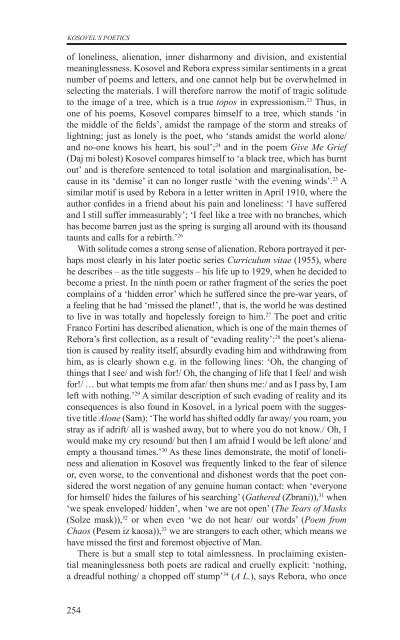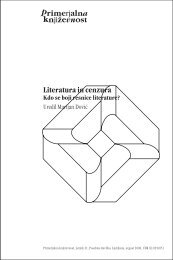razprave (pdf) - Društvo za primerjalno književnost - ZRC SAZU
razprave (pdf) - Društvo za primerjalno književnost - ZRC SAZU
razprave (pdf) - Društvo za primerjalno književnost - ZRC SAZU
- No tags were found...
Create successful ePaper yourself
Turn your PDF publications into a flip-book with our unique Google optimized e-Paper software.
KOSOVEL’s poeticsof loneliness, alienation, inner disharmony and division, and existentialmeaninglessness. Kosovel and Rebora express similar sentiments in a greatnumber of poems and letters, and one cannot help but be overwhelmed inselecting the materials. I will therefore narrow the motif of tragic solitudeto the image of a tree, which is a true topos in expressionism. 23 Thus, inone of his poems, Kosovel compares himself to a tree, which stands ‘inthe middle of the fields’, amidst the rampage of the storm and streaks oflightning; just as lonely is the poet, who ‘stands amidst the world alone/and no-one knows his heart, his soul’; 24 and in the poem Give Me Grief(Daj mi bolest) Kosovel compares himself to ‘a black tree, which has burntout’ and is therefore sentenced to total isolation and marginalisation, becausein its ‘demise’ it can no longer rustle ‘with the evening winds’. 25 Asimilar motif is used by Rebora in a letter written in April 1910, where theauthor confides in a friend about his pain and loneliness: ‘I have sufferedand I still suffer immeasurably’; ‘I feel like a tree with no branches, whichhas become barren just as the spring is surging all around with its thousandtaunts and calls for a rebirth.’ 26With solitude comes a strong sense of alienation. Rebora portrayed it perhapsmost clearly in his later poetic series Curriculum vitae (1955), wherehe describes – as the title suggests – his life up to 1929, when he decided tobecome a priest. In the ninth poem or rather fragment of the series the poetcomplains of a ‘hidden error’ which he suffered since the pre-war years, ofa feeling that he had ‘missed the planet!’, that is, the world he was destinedto live in was totally and hopelessly foreign to him. 27 The poet and criticFranco Fortini has described alienation, which is one of the main themes ofRebora’s first collection, as a result of ‘evading reality’: 28 the poet’s alienationis caused by reality itself, absurdly evading him and withdrawing fromhim, as is clearly shown e.g. in the following lines: ‘Oh, the changing ofthings that I see/ and wish for!/ Oh, the changing of life that I feel/ and wishfor!/ … but what tempts me from afar/ then shuns me:/ and as I pass by, I amleft with nothing.’ 29 A similar description of such evading of reality and itsconsequences is also found in Kosovel, in a lyrical poem with the suggestivetitle Alone (Sam): ‘The world has shifted oddly far away/ you roam, youstray as if adrift/ all is washed away, but to where you do not know./ Oh, Iwould make my cry resound/ but then I am afraid I would be left alone/ andempty a thousand times.’ 30 As these lines demonstrate, the motif of lonelinessand alienation in Kosovel was frequently linked to the fear of silenceor, even worse, to the conventional and dishonest words that the poet consideredthe worst negation of any genuine human contact: when ‘everyonefor himself/ hides the failures of his searching’ (Gathered (Zbrani)), 31 when‘we speak enveloped/ hidden’, when ‘we are not open’ (The Tears of Masks(Solze mask)), 32 or when even ‘we do not hear/ our words’ (Poem fromChaos (Pesem iz kaosa)), 33 we are strangers to each other, which means wehave missed the first and foremost objective of Man.There is but a small step to total aimlessness. In proclaiming existentialmeaninglessness both poets are radical and cruelly explicit: ‘nothing,a dreadful nothing/ a chopped off stump’ 34 (A L.), says Rebora, who once254
















